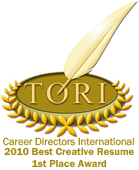
If you suspect your speaking style is holding you back from landing your dream job, consider auditing and correcting old speaking habits.
I can’t be the only person on the planet who has left a meeting and slapped herself on the forehead for saying something that came out wrong. In a job interview, that kind of mistake can cost a job offer.
If you suspect your speaking style is holding you back in your search for your dream job, consider these changes in your approach.
Know your thinking, personality and speaking styles: Each of us has a specific way of processing information that can help and hinder our ability to speak our mind.
For example, I am an external processor. That means to know what I am thinking, I need to talk or write about it. As a result, I’m great a brainstorming but not so great at formal business meetings where the practice is to present a statement.
My husband is an internal processor. He has to go off and think about things before he says them. He’s the one who looks like a genius at business meetings because when everyone else is done saying what they think, he caps off the conversation with a beautifully cogent statement that outlines the issues, summarizes the approach, and solves the problem. Luckily, we don’t attend the same business meetings anymore, or I might have to spill coffee on him.
We also have personality styles such as introversion and extroversion that make it easier or harder to engage with others.
Finally, we have habits learned through years of untrained speaking, habits picked up in our family of origin, and usage trends (remember Valley Girls?). All of these can work together to create communication challenges.
Video yourself: The hardest part about improving verbal communication is to figure out what needs help. I like to use a video to do this. Just set up your smart phone or video camera in a place where you can record a prolonged conversation with several people. Talk long enough that you forget you’re recording and settle into your natural speaking patterns.
Then, take a deep breath and study the video. Note your habits, tics, and mannerisms. Do you interrupt others? Do you pause longer than is comfortable? Do you wave your arms a lot? Do you end all of your sentences as if they were questions, even if they’re not? (That’s a common practice for women and people in Minnesota and North Dakota.)
Correct counterproductive habits: Give yourself points for awareness, and then take steps to correct what you don’t like. Concentrate on one thing at a time rather than trying to change several habits at once.
Think twice, talk once: In formal settings such as business meetings, make a habit of collecting your thoughts before speaking. Jot down and organize your ideas while others are speaking. Then talk.
Practice: Put yourself in situations in which you will be able to practice speaking. You don’t have to jump into giving a presidential address; just take advantage of opportunities to speak with people singly, in small groups, and at meetings.
Join ToastMasters: There is a ToastMasters group in every town that has more than one grocery store. Find a club close to you on their Web site. They welcome new members warmly and offer instruction and practice in prepared and impromptu speaking.
Hire a coach: Many public speakers are also speaking coaches. My favorite is Missy Ohe of The Ohepen Mind. You’ll improve your speaking ability and have so much fun you’ll never want to stop.
Improving your job search communication will have far-reaching effects since it will turn into better job communication. Cogent, clear speech is valued in every industry and at every level.
If your job search is presenting problems you don’t know how to solve, contact me right away. I can help you figure out what is going on and decide how to address it.
Related
Job Search Communication: Find the right contact information
Job Search Communication: Listen
Image courtesy stockimages at freedigitalphotos.net








